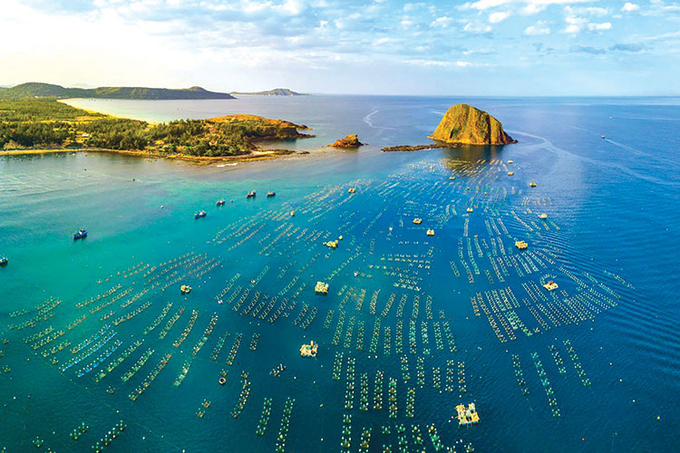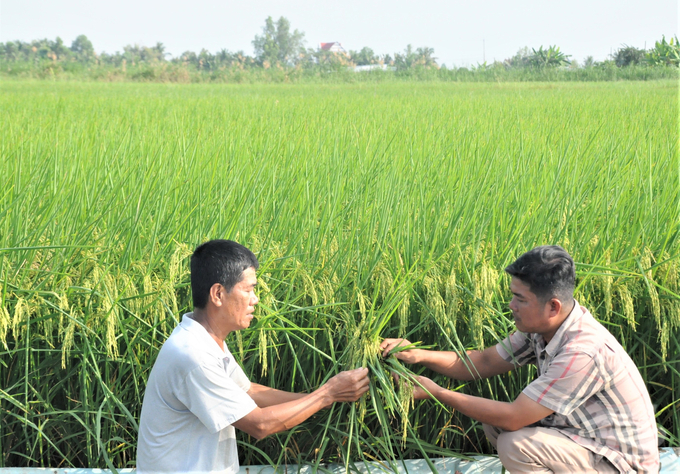May 21, 2025 | 03:18 GMT +7
May 21, 2025 | 03:18 GMT +7
Hotline: 0913.378.918
May 21, 2025 | 03:18 GMT +7
Hotline: 0913.378.918
The Ministry of Agriculture and Rural Development (MARD) organized a conference on May 31 to present the Fisheries Resource Protection and Exploitation Plan for the period 2021 - 2030, with a long-term vision until 2050.
The plan comprises two overarching objectives, eight particular targets, and eight proposed solutions. In order to successfully carry out this plan, it is crucial to have the involvement of the entire political system, particularly local authorities, in collaboration with Decision 1664 which sanctions the Project on Marine Aquaculture Development until 2030.

According to Deputy Minister of Agriculture and Rural Development Phung Duc Tien, if organized well, Vietnam's marine farming industry will be updated with international development momentum. Photo: TL.
Phung Duc Tien, the Deputy Minister of MARD, announced that the input of delegates has enhanced the plan's development to ensure its completion for prompt submission to the Prime Minister. He stressed the importance of organizing the implementation at the local level. Therefore, to carry out the plan, MARD has formulated an implementation strategy for the timeframe of 2025 - 2030, with a long-term vision extending to 2050.
The Deputy Minister stated that the new plan will be implemented in coordination with Resolution No. 36, which outlines the strategy for the sustainable development of Vietnam's marine economy until 2030 and beyond 2045. Additionally, it will align with Decision No. 339, approved by the Prime Minister, which sets out the strategy for the development of Vietnam's fisheries sector until 2030 and beyond to 2045.
The Deputy Minister emphasized the ongoing implementation of plans and programs in a coordinated manner, ensuring everything is clear and consistent. He implored local authorities to give resources for execution in accordance with the directive's essence.
During the initial stage, arranging fishing operations for fishermen and executing measures to enforce maritime prohibitions is imperative. There are currently numerous rules and time-specific measures in place, particularly during the breeding season, to safeguard and restore fishing resources.
Deputy Minister Phung Duc Tien announced that the fisheries industry has set a target of achieving an exploitation level of 2.8 million tons and marine farming of 850,000 tons by 2030. Nevertheless, the fisheries industry has made significant progress, forecasting that marine aquaculture will surpass 850,000 tons by the conclusion of 2024 and will reach 1.45 million tons by 2030.
"By following this current trajectory of progress, in conjunction with investments in infrastructure, preservation efforts, and improvements in aquaculture, we will successfully reach and exceed the established objectives." "With advanced marine farming technology, Vietnam's marine aquaculture sector can align itself with global development trends if we effectively manage the review, allocation of sea surface, breeding, feed, nutrition, disease prevention, and preliminary processing," Deputy Minister Phung Duc Tien emphasized.
Deputy Minister Phung Duc Tien discussed the agricultural sector's output status during the first five months of 2024 while speaking to the press at the conference that unveiled the Fisheries Resource Protection and Exploitation Plan for the period 2021-2030, with a vision for 2050. During the initial five months of 2024, our agriculture sector saw substantial challenges due to climate change and saline intrusion, in addition to the overall economic issues. Nevertheless, with the oversight and guidance of the Government and the Ministry of Agriculture and Rural Development (MARD), the agricultural sector has attained promising outcomes.

Accurate forecasting of the drought and salinity situation has helped agricultural production in the first months of the year reap success. Photo: Trung Chanh.
More precisely, the output of rice increased by 2% compared to the corresponding time of the previous year, reaching a total of 17.84 million tons. The pig population in livestock experienced a growth of 3.8%, while the poultry population expanded by 3.3%. This increase in livestock numbers has contributed to a consistent food supply. Additionally, after several years, there has been a rise in pricing for livestock products, which has been advantageous for farmers. The fishery sector achieved a total production of 3.5 million tons, with 1.9 million tons attributed to fishing and 1.6 million tons to aquaculture, representing a 2.6% increase. The forestry sector produced a total of 12.5 million cubic meters of timber from cultivated forests, representing a 3.7% increase.
The value of agricultural, forestry, and fishery exports in the first five months amounted to USD 24.14 billion, representing a 21% increase compared to the same period last year. During this time, there was a trade surplus of USD 6.53 billion, which is 64.5% more than the previous year.
Based on these statistics, the Deputy Minister expresses confidence that under the guidance of the Prime Minister and the diligent work of MARD, the agricultural sector is expected to achieve highly favorable outcomes this year.
The Deputy Minister has stated that the rice sector's goal for this year is to export more than 8 million tons of rice, to surpass the 8.13 million tons reached in 2023.
The Deputy Minister of MARD reported that during the first five months of the year, rice exports reached USD 2.65 billion, showing a significant increase of 38.2%. This information was shared during MARD's meeting with the Ministry of Industry and Trade and the Vietnam Food Association (VFA) to discuss establishing a minimum price for rice exports. Vietnamese rice exports experienced growth in both quantity and quality, resulting in an enhanced global reputation and brand value for Vietnamese rice.
"Given the significant impact of climate change, adverse weather conditions, market fluctuations, and diseases on agricultural production, the Southern Institute of Water Resources Research has provided accurate forecasts this year regarding the drought and salinity situation." Deputy Minister Phung Duc Tien revealed that MARD has increased investments to enhance weather and salinity forecasts. Additionally, they have guided provinces on planting schedules, care processes, and salinity mitigation measures to achieve optimal production efficiency.
Translated by Dieu Linh

(VAN) In 2024, over 295 million people across 53 countries and territories faced acute hunger—an increase of almost 14 million people compared to 2023, while the number of people facing catastrophic levels of hunger reached a record high.

(VAN) World Environment Day 2025 (June 5) carries the theme 'Beat Plastic Pollution' continuing to emphasize the global urgency of addressing the plastic waste crisis.

(VAN) This was the assessment shared by experts at the workshop titled 'Assessing the Role and Potential of Low-Emission Rice Production Systems in Vietnam,' held on the morning of May 19.

(VAN) Cai Rong Port is the fisheries control center of Quang Ninh, helping to monitor fishing vessels, combat IUU fishing, and remove the EC's 'yellow card'.

(VAN) The German Agricultural Society (DLG) explores the possibility of establishing a mechanization service center in Vietnam’s Mekong Delta to support farmers in accessing and utilizing advanced machinery.

(VAN) On May 16, the Department of Water Resources Management, in collaboration with the Food and Agriculture Organization of the United Nations (FAO), held a signing ceremony for the GEF-8 project document.

(VAN) Food safety, mechanization, vocational training, and market opening are key areas of cooperation expected between the Vietnamese Government and the Federal Republic of Germany.